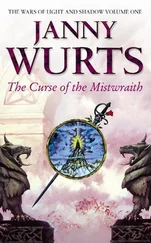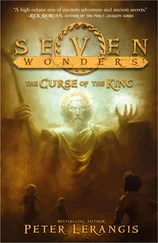She was smiling, but her banter was forced, the lines delivered from an actress who could not identify with her character. The doctor, of course, detected her discomfiture at once.
“Muriel,” he said, “what is it?”
“It’s nothing. Really.” She looked directly into his dark eyes and said beseechingly, “Tell me what happened. John says he doesn’t remember, but I don’t know whether I can . . .”
“I can speak only of the aftermath,” the doctor answered. “The rest—the part I suppose you’d like to know—is speculation, Muriel.”
She waited for him to go on. A few feet away the dance went on, a confusion of whirling color, black and white, red and gold.
“And I do not speculate,” he added.
“He’s changed,” she said.
“I’m aware of that.”
“I don’t mean physically. Though that, too. . . . He hasn’t eaten a decent meal since we returned. He tries . . . and gags to the point of choking. And he won’t . . . He doesn’t want to keep himself properly groomed. You know what a stickler he was about hygiene, Pellinore. I have to bathe him after he falls asleep. But the worst . . . I don’t know how to describe it . . . The vacancy , Pellinore . . . He is there . . . and he is not there.”
“Patience, Muriel. It’s been less than three weeks.”
She shook her head. “That is not what I mean. I am his wife. I knew the man who went into the wilderness. I do not know the man who came out of it.”
At that moment Damien Gravois appeared at her side. “There you are,” he cried softly. “I thought I had lost you.”
Muriel smiled down upon his glowing countenance; he was a good two inches shorter.
“Monsieur Henry asked me for a dance,” she teased. “S’il vous plait, pardonnez-moi.”
“ Bien sûr, but if Monsieur Henry persists in these outrageous attempts to steal my date away, I shall challenge him to a duel.”
He turned to the doctor. “Now, Pellinore, I am taking the wagers for this year.” He pulled a slip of paper from his waistcoat. “I still have nine twenty, ten fifteen, and eleven thirty open if you’d care to—”
“Gravois, you know I do not gamble.”
He shrugged. Muriel laughed lightly at my bewildered expression. “For the fight, Will. It happens every year.”
“The later times book up quickly,” put in Gravois. “The alcohol.”
“Who fights?” I asked.
“Practically everyone. The Germans always start it,” Gravois said with a sniff.
“It was the Swiss contingent last year,” Muriel said.
“You realize how utterly absurd that is,” Gravois said. “The Swiss!”
“There are few things more hopelessly ridiculous, Will Henry,” said the doctor, “than an all-out brawl among scientists.”
The brawl began a little after ten o’clock—at ten twenty-three precisely, according to Gravois’s watch (he was the designated timekeeper for that year)—when an Italian monstrumologist named Giuseppe Giovanni accidentally (or so claimed Dr. Giovanni later) bumped into the date of a Greek colleague, causing her to spill her champagne down the front of her silk gown. The Greek rewarded the Italian’s clumsiness with a roundhouse blow to the side of Giovanni’s head, which sent his pince-nez flying across the room and into the back of the head of a Dutchman named Vander Zanden, who perceived that the man dancing behind him—a French colleague of Gravois’s—had reached out and flicked him with his forefinger. The ensuing melee cleared the dance floor. Chairs smashed. Glasses and bottles shattered. Men shuffled across the floor with their arms wrapped around each other, impotently pounding their new partners on the back. The band played a rather rollicking ditty for a few minutes until the musicians were forced to flee after two men jumped onto the little stage and grabbed the music stands to hurl at each other’s heads. The police were called to break it up—the duty falling, again, to Gravois, the self-designated master of ceremonies—but it was all but over by the time the police arrived.
“Who won the pool?” asked the doctor afterward.
“You will not believe this, Pellinore,” answered Gravois.
“You did.”
“It is a miracle, is it not?”
“Pity John couldn’t be here,” Warthrop said, taking in the devastation. “This was always his favorite part of the colloquium.”
He did not speak to me until we returned to the Plaza.
“Don’t do it now, but when we get to the door, take a look behind us, Will Henry. I believe we are being followed.”
I followed his instructions, turning at the entrance to the hotel, whereupon I saw hurrying across Fifth Avenue a tall, gangly man of around twenty, a bowler hat pulled low over his ears. He was dressed in a shabby black jacket and threadbare trousers, the knees of which were worn nearly clear through.
“Who is it?” I asked the doctor.
“My erstwhile New York shadow,” he answered, and said no more.
SEVENTEEN
“Ich Habe Dich Auch Vermisst ”
In those days the Society for the Advancement of the Science of Monstrumology—or “the Society,” as it was informally known—was headquartered on the corner of Twenty-second and Broadway, in an imposing structure designed in the neo-Gothic tradition, with narrow arched windows and doorways, soaring turrets, and snarling gargoyles hunkered at the cornices. Originally it had been an opera house, but the company had gone bankrupt in 1842 and had sold the building to the Society, which had refurbished the structure to fit its own peculiar needs.
The main auditorium had been converted to a lecture hall and general assembly, where monstrumologists from around the world gathered for their annual congress. The second and third stories contained meeting rooms and administrative offices. The entire fourth floor had been gutted and remodeled into an extensive library that housed more than sixteen thousand volumes, including original manuscripts rescued from the Royal Library of Alexandria after Julius Caesar accidentally torched it in 48 b.c.
I did not know what to expect at my first congress. All I knew was that my mentor looked forward to the annual event the way a child anticipates Christmas morn. Once each year the crème de la crème of this odd and most esoteric of professions gathered to share their latest discoveries, to expound upon the cutting-edge research and methods, and to gather what comfort they could in a convivial gathering of like-minded souls who, for whatever reason, felt compelled to spend their lives studying creatures the majority of humankind would rather see extinct.
If I shared, by means of that peculiar osmosis of a keeper with his child, any of my master’s enthusiasm, it was soon squelched at the commencement of the congress. I passed the hours of that first day in the main auditorium, with only a thirty-minute respite for lunch, in a stultifying atmosphere of interminable speeches delivered in dry monotones by men who possessed no oratorical gifts whatsoever (some with accents so thick as to render the mother tongue unrecognizable) on topics equally dull and arcane.
The congress formally began with a kind of roll call. The president pro tempore, the same Dr. Giovanni whose clumsiness had started the brawl the night before—he was sporting an impressive shiner and a large patch over his nose—stood at the lectern lugubriously reading aloud names from a long piece of foolscap, to which some in the hall responded with an “Aye!” and to which others made no reply at all.
I watched—or rather endured— the proceedings from a vantage point high above the stage. We were seated upon a dilapidated divan inside the doctor’s private box, bestowed upon the family Warthrop by the Society in recognition of three generations of familial dedication to the cause. By ten o’clock, we had finally reached the F ’s, and the doctor was nearly beside himself with boredom. I suggested this would be an excellent time to catch up on his sleep—he had tossed and turned the night before—but my gentle proposition was met with withering disdain.
Читать дальше












